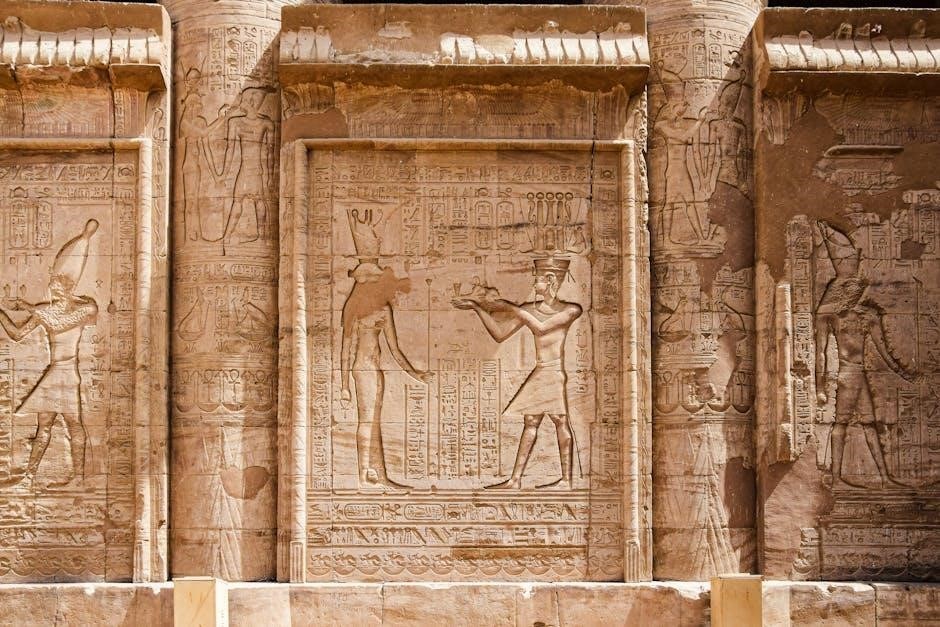Suzan-Lori Parks’ Topdog/Underdog is a dark comedy exploring brotherly rivalry, identity, and history through Lincoln and Booth, two African-American brothers with ironically symbolic names.
Overview of the Play
Suzan-Lori Parks’ Topdog/Underdog is a Pulitzer Prize-winning dark comedy that delves into themes of brotherly love, family identity, and history. The play revolves around two African-American brothers, Lincoln and Booth, whose names, chosen by their father as a twisted joke, reflect their struggles with identity and legacy.
Significance of the Title
The title Topdog/Underdog symbolizes the constant power struggle and sibling rivalry between Lincoln and Booth. It reflects their alternating roles of dominance and submissiveness, highlighting themes of identity, competition, and the cyclical nature of their relationship, deeply rooted in their shared history and societal expectations.
Pulitzer Prize Recognition
Topdog/Underdog earned Suzan-Lori Parks the Pulitzer Prize for Drama in 2002, a landmark achievement. This recognition underscored the play’s innovative storytelling and its profound exploration of themes such as race, identity, and sibling rivalry, cementing its place in contemporary American theater history.

Plot Summary and Key Themes
The play revolves around Lincoln and Booth, two brothers grappling with identity, history, and sibling rivalry, blending humor with poignant reflections on race and family.
Brotherly Love and Rivalry
Lincoln and Booth’s relationship is a complex mix of affection and competition, rooted in their shared history of abandonment and the ironic names chosen by their father. Their bond is tested by sibling rivalry, as they navigate identity, power dynamics, and the legacy of their family’s past, revealing both love and tension.
Family Identity and History
The play delves into the brothers’ troubled past, with their names, Lincoln and Booth, symbolizing a twisted familial joke. Their father’s abandonment and the weight of historical figures’ legacies shape their identities, reflecting broader themes of heritage and its impact on personal and societal trajectories.
Dark Comedy Elements
The play uses dark humor to explore themes of poverty, identity, and brotherly conflict. Scenes like Booth pressuring Lincoln to leave blend tension with absurdity, highlighting the characters’ struggles through a comedic yet poignant lens. This contrasts sharply with the serious undertones of their plight, creating a unique narrative balance.

Main Characters in the Play
Lincoln and Booth, two African-American brothers, navigate their dysfunctional relationship, with their ironically symbolic names reflecting their struggles with identity, family, and societal expectations.
Lincoln: The Older Brother
Lincoln, the older brother, is a complex character grappling with identity and societal expectations. His occupation as a Lincoln impersonator highlights ironic historical references. Wearing a blue suit with a bright tie, Lincoln’s attire contrasts with Booth’s subdued style, symbolizing their shifting dynamics and internal conflicts amidst their darkly comedic struggle for dominance and self-definition.
Booth: The Younger Brother
Booth, the younger brother, is driven by ambition and resentment, often clashing with Lincoln. His name, referencing John Wilkes Booth, adds historical irony. Wearing a subdued brown suit, Booth’s character embodies a mix of vulnerability and aggression, striving to outshine his brother and claim the role of “topdog” in their fraught relationship.
Historical References in Character Names
The names Lincoln and Booth carry significant historical weight, referencing President Abraham Lincoln and his assassin, John Wilkes Booth. This duality underscores themes of freedom, tragedy, and the lasting impact of history on individual and collective identity, adding depth to the brothers’ complex relationship and societal context.
Script Availability and Download
The Topdog/Underdog script is available as a free PDF download, sized at 24 MB, making it easily accessible and compatible with various devices for convenient reading and storage.
PDF Format and File Details
The script is available in PDF format, ensuring compatibility across devices. The file size is 24 MB, making it lightweight for easy download and storage. This format preserves the play’s original layout, including dialogue and stage directions, providing an authentic reading experience for audiences and scholars alike.
Where to Find the Script Online
The PDF script can be found on platforms like the Internet Archive and Dramatists Play Service. Websites such as Google Books and educational repositories also offer access. Additionally, online marketplaces like Amazon provide the eBook version, ensuring widespread availability for readers and researchers interested in Suzan-Lori Parks’ work.
Downloading the Script
The Topdog/Underdog script in PDF format is easily downloadable from platforms like the Internet Archive and Dramatists Play Service. With a file size of 24 MB, it ensures quick access. Simply navigate to the website, search for the title, and follow the download prompts to save the file for offline reading and study;
Structure and Style of the Script
The script’s structure includes clear dialogue and stage directions, enhancing the dark comedy. The PDF format ensures easy readability, with a small file size for convenient access.
Dialogue and Stage Directions
The script’s dialogue is sharp and rhythmic, capturing the tension between Lincoln and Booth. Stage directions detail their attire, with Booth in brown and Lincoln in blue, reflecting their contrasting roles. The PDF format preserves these elements, ensuring clarity in performance instructions and character dynamics, vital for portraying the play’s dark comedy and sibling rivalry themes effectively.
Act and Scene Breakdown
The Topdog/Underdog script is divided into acts and scenes, each advancing the brothers’ tense relationship; The PDF format preserves Parks’ structured pacing, with clear act breaks that escalate tension and reveal character dynamics. This breakdown aids in understanding the play’s progression, emphasizing its darkly comedic tone and thematic depth through concise, impactful scenes.
Language and Tone
The script’s language is raw and realistic, mirroring the brothers’ gritty reality. Parks employs a blend of dark humor and emotional intensity, creating a tone that oscillates between levity and profound introspection. The PDF format retains this stylistic nuance, allowing readers to experience the play’s sharp dialogue and layered symbolism as intended by the playwright.

Themes and Motifs
Themes include race and identity, family dynamics, and historical legacy, with motifs of power struggles and societal expectations shaping the brothers’ experiences in the play.
Race and Identity
Race and identity are central themes, as the brothers’ names, Lincoln and Booth, symbolize historical racial tensions. Their struggles with self-worth and societal expectations highlight the lasting impact of slavery and systemic racism, explored through dark humor and poignant dialogue, reflecting Parks’ critique of race relations in America.
Family Dynamics
The play delves into the strained relationship between Lincoln and Booth, two brothers grappling with abandonment and a shared history of slavery. Their bond, marked by rivalry and loyalty, reflects the emotional scars left by their father’s desertion, shaping their interactions and defining their sense of self within a fractured family legacy.
History and Legacy
The play reflects on the historical legacy of slavery and freedom, symbolized through the brothers’ names, Lincoln and Booth. Their struggles mirror the broader societal tensions of race and identity, while the Pulitzer Prize win in 2001 cemented its place as a landmark in contemporary American theater, offering a powerful commentary on history’s enduring impact.
The Playwright: Suzan-Lori Parks
Suzan-Lori Parks is a Pulitzer Prize-winning playwright known for her innovative storytelling and exploration of race, identity, and history. Her work, including Topdog/Underdog, has garnered critical acclaim for its bold and thought-provoking narratives.
Biography and Career
Suzan-Lori Parks, born in 1963, is a renowned American playwright, screenwriter, and novelist. She gained acclaim for her innovative storytelling and exploration of race, identity, and history. Her play Topdog/Underdog earned her the Pulitzer Prize in 2002. Parks’ work often blends humor with poignant social commentary, making her one of the most influential voices in contemporary theater.
Other Notable Works
Beyond Topdog/Underdog, Suzan-Lori Parks has written The America Play, In the Blood, and Venus, exploring themes of race and identity. Her Father Comes Home from the Wars trilogy reimagines Greek drama in a modern context. Parks also wrote White Noise and adapted works like The Gilded Six Bits and Native Son. Her novels include Getting Mother’s Body and The Man Who Caught the Airplanes.
Reception and Critical Acclaim
Topdog/Underdog received widespread acclaim for its bold exploration of race, identity, and family dynamics. Winner of the 2002 Pulitzer Prize for Drama, it solidified Suzan-Lori Parks’ reputation as a groundbreaking playwright. Critics praised its dark humor and poignant storytelling, while audiences connected with its raw, emotional depth. The play remains a landmark in contemporary theatre.
Reception and Reviews
Topdog/Underdog has been praised for its bold themes and emotional depth. Audiences and critics acclaim its dark humor and poignant storytelling, making it a standout in contemporary theatre.
Audience Response
Audience Response
Audiences have praised Topdog/Underdog for its powerful exploration of brotherly dynamics and racial identity. The dark comedy resonated deeply, with many finding the emotional depth and sharp dialogue thought-provoking. Its unique storytelling and strong performances have made it a favorite, sparking discussions about family, history, and legacy, leaving a lasting impact on viewers.
Critical Analysis
Critics acclaim Topdog/Underdog for its bold exploration of race, identity, and brotherly conflict. Parks’ Pulitzer-winning script is praised for its original dialogue and emotional depth, offering a fresh perspective on African-American experiences. The play’s dark comedy and historical undertones resonate deeply, challenging societal norms and leaving a lasting impression on audiences and scholars alike.
Cultural Impact
Topdog/Underdog has left a significant mark on contemporary theater, sparking conversations about race, identity, and brotherhood. Its darkly comedic tone and historical references resonate culturally, challenging stereotypes and fostering dialogue. The play’s accessibility in PDF format has broadened its reach, making it a vital resource for studying African-American experiences and theatrical innovation.

Scene Analysis and Key Moments
The play’s iconic scenes, like Booth impersonating Honest Abe, highlight the brothers’ rivalry and identity struggles. Symbolism, such as their suit colors, underscores themes of power and legacy.
Iconic Scenes
The play features iconic scenes like Booth impersonating Honest Abe, symbolizing historical irony and identity struggles. The brothers’ suit-switching moment highlights power dynamics and their intertwined fates, showcasing Parks’ mastery of symbolism.
Symbolism and Metaphors
The brothers’ names, Lincoln and Booth, symbolize historical legacy and racial tension. Their suit colors—blue for Lincoln, brown for Booth—represent contrasting futures. Card tricks and impersonations metaphorically explore themes of deception, identity, and the cyclical nature of history, adding depth to the narrative.
Character Development
Lincoln and Booth’s evolving relationship reveals their complexities. Lincoln, the older brother, struggles with identity and stability, while Booth embodies rebellion and ambition. Their interactions expose deep-seated insecurities and desires, showcasing growth and understanding amidst their rivalry.
Topdog/Underdog is a gripping exploration of brotherly dynamics, identity, and societal expectations. Parks’ Pulitzer-winning play leaves a lasting impact, blending humor with poignant truths about family and history.
Final Thoughts
Topdog/Underdog is a profound exploration of brotherly rivalry, identity, and societal expectations. Suzan-Lori Parks’ Pulitzer-winning play masterfully blends dark humor with poignant truths, offering a compelling commentary on family dynamics and historical legacy. The script, widely available in PDF format, remains a vital read for understanding contemporary theater and its ability to reflect human complexity.
Recommendation
Topdog/Underdog is a must-read for theater enthusiasts and scholars. Its Pulitzer Prize-winning narrative offers a raw, unflinching look at brotherly rivalry, identity, and societal expectations. The PDF script provides a convenient way to explore Parks’ masterful dialogue and themes, making it a vital resource for understanding contemporary American theater and its cultural significance.
Further Reading
Explore Topdog/Underdog script PDF for a deeper dive into its themes. Check out similar plays, related themes, and additional resources for a comprehensive understanding of its significance.
Similar Plays
Plays like Fences by August Wilson and Jitney explore similar themes of race, family, and identity. These works, like Topdog/Underdog, delve into the complexities of African-American experiences, historical legacy, and interpersonal dynamics, offering rich comparisons for readers interested in these subjects.
Related Themes
Topdog/Underdog explores themes of race, identity, and family dynamics, resonating with works that examine societal inequities and personal struggles. The play’s focus on brotherly conflict and historical legacy aligns with broader discussions of economic hardship, social inequality, and the search for self-definition in contemporary African-American experiences.
Additional Resources
For deeper analysis, explore study guides, critical essays, and video discussions available online. Platforms like Scribd and the Internet Archive offer Topdog/Underdog scripts and related materials. Additionally, academic databases provide insightful essays on the play’s themes and dramatic structure, enhancing your understanding of Parks’ unique storytelling and its cultural significance.
